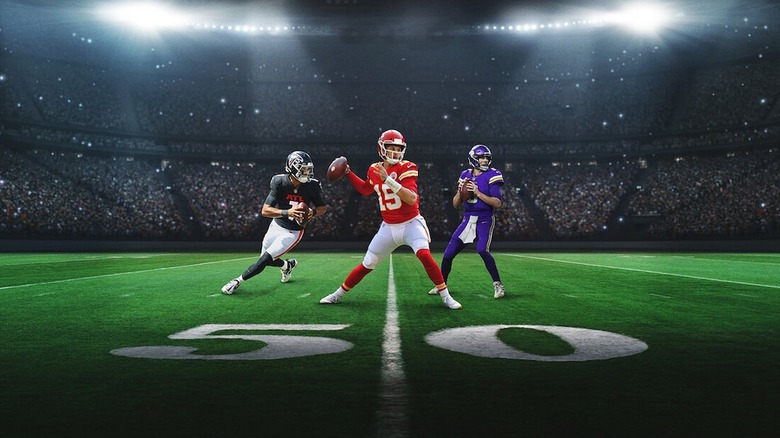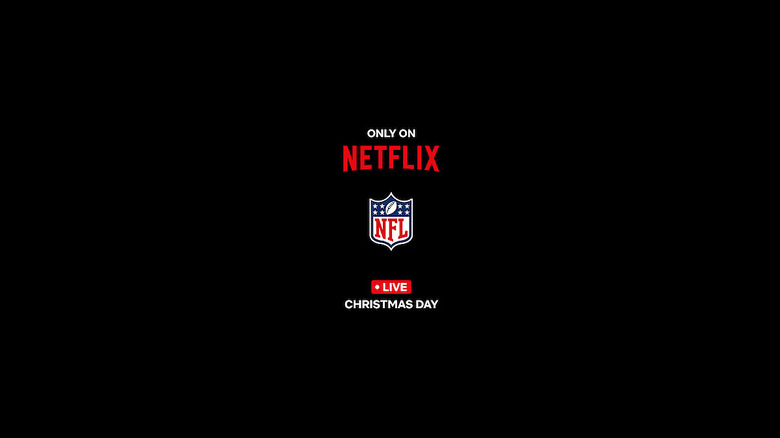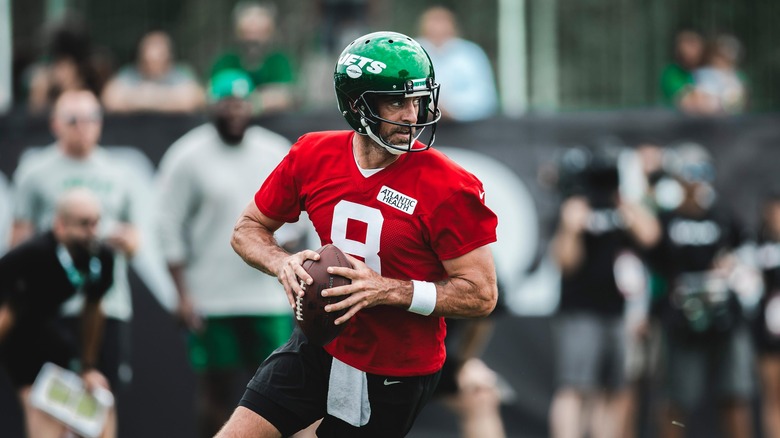Netflix's NFL Deal Is The Streamer's Biggest Investment In Live Sports – Here's Why It's A Huge Deal
It's official: The NFL is coming to Netflix. The world's largest streaming service has confirmed that it will broadcast two Christmas day NFL football games this year, with at least one game to follow in 2025 and 2026. Financial terms of the deal were not disclosed, but Bloomberg suggests it was in the $150 million per-game range. Is that expensive? Yes. But if Netflix just makes one less really expensive movie per year like "Red Notice" they should be just fine.
Netflix has been dipping its toes into live events in recent months, mostly with comedy specials. This, however, marks the streamer's first major foray into the world of live sports. It just so happens to be with the king of all American sports leagues. Netflix Chief Content Officer Bela Bajaria had this to say about it:
"Last year, we decided to take a big bet on live — tapping into massive fandoms across comedy, reality TV, sports, and more. There are no live annual events, sports or otherwise, that compare with the audiences NFL football attracts. We're so excited that the NFL's Christmas Day games will be only on Netflix."
Indeed, the majority of the most-watched live events in a given year are led by NFL games, with the Super Bowl representing the biggest of big fish. In recent years, the league has been embracing streaming as the future, making a deal with Amazon to stream Thursday Night Football on Prime Video, while YouTube TV now holds the (very expensive) Sunday Ticket rights. Plus, Peacock has been simulcasting Sunday Night Football in recent years. NBCUniversal's streaming service also got an exclusive playoff game earlier this year, which resulted in Peacock gaining 2.8 million new subscribers. Therein lies the key to this Netflix deal.
A mutually beneficial partnership for Netflix and the NFL
As the streaming wars have raged on, we've seen these streaming services run up against a ceiling in subscriber growth. That's why Netflix and Disney+ have cracked down on password sharing in recent months, and that has resulted in more subscriptions. Live sports have long been seen as one of the largest areas for potential growth. As cable and traditional TV continue to slowly die, everyone in the media business needs to ensure a streaming-focused future. Hence, the NFL is hedging its bets by getting into business with multiple streamers. For years, DirecTV had the Sunday Ticket rights. Now? It's YouTube. Times are changing.
Yes, many NFL games still air on live TV channels such as ABC, NBC, Fox, and CBS, but the league understands that they can't ignore streaming if they want to retain a massive audience, in addition to reaching younger, new fans, who are certainly watching the majority of TV on streaming services. Given that Netflix is the largest streaming service around, this new deal makes perfect sense for both sides. Hans Schroeder, NFL Executive Vice President of Media Distribution, had this to say:
"We couldn't be more excited to be the first professional sports league to partner with Netflix to bring live games to fans around the world. The NFL on Christmas has become a tradition and to partner with Netflix, a service whose biggest day of the year is typically this holiday, is the perfect combination to grow this event globally for NFL fans."
Unfortunately, live sports rights don't come cheap and the NFL isn't cutting anyone any breaks on the price to get into the streaming game. That means, inevitably, Netflix will use these live sporting events to raise prices yet again. The potential to squeeze more profit per-customer is the real endgame here.
It's all about getting more money from streaming
The biggest problem the industry is facing right now is that cable is dying, which means the years of turning nice profits from linear TV are dying, too. Streaming, meanwhile, has yet to become profitable for most of these companies. If it's profitable at all, as it's become for Max, those profits don't touch the heydays of cable. In short, streaming must make more money in the coming years and sports is a way to squeeze more money out of it.
Aside from the price hikes, these games contain ad-breaks, even for customers who pay for Netflix's ad-free tiers. As a result, Netflix can sell (presumably pricey) ad slots during these games, which will bring in even more revenue. That's probably going to be the model for sports going forward for the major streamers, just as it was for cable and live TV for decades. Everything old is becoming new again. Case in point, streaming bundles are becoming a thing, which is basically just going to emulate cable for the streaming age.
Netflix already had success with its 2023 docuseries "Quarterback." They've had success with other sports-related programming. It only makes sense that they are now pursuing live sports. As for whether or not that's a good thing for fans? That remains to be seen.
For the moment, NFL die-hards who want to watch every single game need to pay for Sunday Ticket through YouTube TV, Prime Video for Thursday Night Football, and now Netflix for the Christmas games, not to mention Peacock. That's a lot of money to shell out, and switching streaming services isn't quite as simple as flipping the channels used to be on cable, at least not yet. For the moment, it's easy to imagine this all being frustrating to the average viewer. I say this as a die-hard NFL fan who finds it all frustrating. But this is what the future is going to be and there is no going back now, for better or worse.


